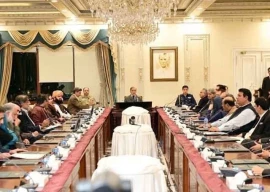
The much-awaited verdict of the Federal Shariat Court (FSC) on interest-free economy, despite being overly delayed, sets the course in the right direction by cogently answering all reservations put forward earlier.
The decision, by validating the practical viability of an interest-free economy, has opened up new opportunities for the realisation of this dream, and should be treated as a stepping-stone by the government and all stakeholders collectively to further build upon.
This was the consensus view of participants of a hybrid roundtable organised by Institute of Policy Studies (IPS), Islamabad, to discuss the way forward following the FSC judgment prohibiting and eliminating interest in all its manifestations.
The session chaired by IPS chairman Khalid Rahman was joined by a galaxy of experts, policy practitioners, scholars and Islamic banking and finance industry leaders such as Dr Waqar Masood Khan, former secretary finance and former SAPM on economic affairs; Dr Salman Syed Ali, lead research economist, Islamic Research and Training Institute, Islamic Development Bank, Jeddah; Dr Muhammad Ayub, director research and training, Riphah Centre of Islamic Business, Riphah International University (RIU); Dr Atiquzzafar Khan, dean, Social Sciences, Riphah International University; Zafar-ul-Hassan Almas, joint chief economist, Planning Commission of Pakistan; Dr Tahir Mansoori, former vice president, International Islamic University, Islamabad; Muhammad Farhan-ul-Haq Usmani, executive vice president and head of Shariah audit and advisory, Meezan Bank; Azeem Pirani, chief executive officer, Pak-Qatar Family Takaful; Hafiz Dr Atif Waheed, leader of Tanzeem-i-Islami, Saifullah Gondal Advocate, special assistant for legal and parliamentary affairs, Jamaat Islami, Dr Anwar Shah, department of economics, Quaid-i-Azam University, Ghazala Ghalib, lecturer, Shariah & Law department, Int’l Islamic University Islamabad (IIUI); Ameena Sohail, legal consultant and IPS associate; Qanit Khalil, chartered accountant and IPS associate; Imran Shafique, advocate high court and visiting professor, IIUI; Ahsan Shafiq, ILKI Foundation, Istanbul; Naufil Shahrukh, IPS’ GM Operations, and Syed Nadeem Farhat, senior research officer at IPS,.
The participants appreciated that the FSC has declared the prohibition of Riba absolute in all its forms and manifestations according to the injunctions of Islam, in yet another landmark decision that had remained pending since 2002.
Chairman IPS was of the view that the FSC has finally given its verditc regarding Riba but there are suspicions about political will in implementing it. If political will is not present, then it will be an even bigger fight than in the case of materializing this judgment.
“This judgment cannot be considered as an end in itself. It is just a step further towards molding the whole economy and financial sector according to the injunctions of Islam and laying the foundations of a true Islamic society”, he remarked.
Rahman stressed that task forces and working groups need to be formed along with advocacy and awareness campaigns. The role of mainstream and social media, scholars and politicians in creating awareness and support for the move is of critical importance, he added.
The experts reminded that Islamic economic system does not just mean Riba-free banking, it means that the whole financial and economic system should be interest-free.
It was mentioned that FSC has given a very reasonable grace period to the federal government and relevant departments till December 31, 2027, for the implementation of the judgment.
The participants cautioned that some of the banks or even any government department might file for a review of the judgment, which may result in yet another stay order causing further stalemate.
They demanded that banks should not be allowed to open any new conventional banking branches following the judgment. The grey areas of banking should be identified and converted into Islamic banking. However, there were few banking products for which there are no alternatives in Islamic banking. As such work should begin in earnest for workable solutions. The need is to work out financing products for specific sectors of the economy, e.g., agriculture, industry, SMEs, etc.
The discussants believed that that FSC judgment has removed any legal resistance in the way of implementing an Islamic economic system and has effectively blocked the way for any review of its judgment.
The judgment has been delivered in pursuance of a remand order of the Supreme Court and has addressed all points mentioned in the judgment. As such there would be a limited chance of success for the federal government if it files an appeal again in the Supreme Court, it was highlighted. Zafar ul Hassan Almas said that the biggest challenge in implementing the FSC judgment will be the seriousness of the government in this regard.
Published in The Express Tribune, May 3rd, 2022.




























-(1)1714378140-0/AliAminMaryam-(4)-(1)1714378140-0-270x192.webp)








COMMENTS
Comments are moderated and generally will be posted if they are on-topic and not abusive.
For more information, please see our Comments FAQ